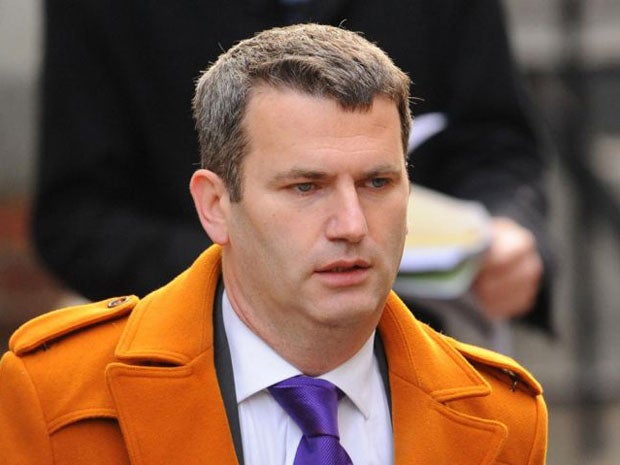NI tried to destroy my life, says lawyer

A lawyer for phone-hacking victims today accused Rupert Murdoch's News International of trying to "destroy" his life.
Mark Lewis, whose clients include the family of murdered schoolgirl Milly Dowler, described being shown a "truly horrific" surveillance video of his ex-wife and 14-year-old daughter shot by a private detective commissioned by the company, which published the News of the World until its closure in July.
He told the Leveson Inquiry into press standards: "News International sought to destroy my life, and very nearly succeeded."
Detectives showed Mr Lewis the surveillance video of his ex-wife and teenage daughter at a police station in Putney, west London, on November 4 2011.
The solicitor told the inquiry that his three other daughters asked him whether they too had been watched by the investigator, who was later identified as former policeman Derek Webb.
He said: "That was truly horrific, that my daughter was videoed, was followed by a detective with a camera - I mean, just followed. That shouldn't happen to anybody's child."
Mr Lewis was also shown a report prepared by a private investigator commissioned by Julian Pike, a partner with law firm Farrer and Co, the inquiry heard.
Prime Minister David Cameron set up the Leveson Inquiry in July in response to revelations that the News of the World commissioned private detective Glenn Mulcaire to hack Milly's phone after she disappeared in 2002.
The inquiry heard Mr Pike suggested Mr Lewis had leaked confidential information about Professional Footballers' Association chief executive Gordon Taylor's settlement with News Group Newspapers over the hacking of his phone.
But Mr Lewis told the inquiry: "I was not the source of that story, I never gave information out.
"It was complete arrogance and idiocy by Julian Pike at Farrers and (News International lawyer) Tom Crone.
"They were so busy navel-gazing that they had not realised there were so many possible sources of this story.
"The story was open, the court file was open for anyone to look at and because they were so arrogant and so stupid, they did not bother to look at that."
Mr Lewis said any suggestion he benefited professionally from representing phone hacking victims was untrue.
The inquiry was shown documents revealing that Mr Crone instructed private detectives to investigate Mr Lewis in May 2010.
Another memo recorded the suggestion that Mr Taylor could be persuaded to take action against Mr Lewis, who represented him in his phone hacking claim against the News of the World.
Mr Lewis said: "To suggest that News Group Newspapers wanted to persuade one of my clients, someone I had acted for, someone I had got a lot of money for, to sue me, even though he had not threatened to sue me, had no wish to sue me, as far as I knew, and did not sue me."
He said the only issue between him and Mr Taylor was "nothing to do with professional conduct".
The inquiry also saw a document that recorded the aim to keep Mr Lewis and fellow solicitor Charlotte Harris, who has represented other phone hacking victims, out of the cases "to reduce the negative publicity".
The inquiry was shown an extract from an internal dossier compiled by News International about Mr Lewis, Ms Harris and fellow media lawyer Mark Thomson.
Under the heading "News of the World strategy", it said: "The News of the World is aware of these facts and is planning to try to put pressure on these solicitors by revealing these facts and by linking their political affiliations and career benefits from the cases.
"They plan to do this publicly and through discreet lobbying."
David Barr, counsel to the inquiry, said to Mr Lewis: "It would appear that what we have is a document suggesting that personal details which have been dug up are to be used against you and your fellow solicitors."
Mr Lewis agreed but pointed out that many of the facts about him in the dossier were wrong, including a suggestion that he went to a secondary modern school when in fact he was privately educated.
Mr Owens told the inquiry he went on sick leave from the ICO with stress in 2005 after being "victimised".
After resigning, he made a claim for constructive dismissal, which was later settled.
Mr Owens was frustrated about the ICO's failure to investigate journalists as part of Operation Motorman, and two-and-a-half months ago he contacted the Independent.
The newspaper published a front page story about his concerns and referred to examples from Whittamore's notebooks on September 14.
The former detective said he expected to receive a "knock on the door" the next day over his alleged breach of Section 59 of the Data Protection Act, which bans past and present ICO staff from disclosing information they obtained through their work.
But nobody from the ICO contacted him and the first people to visit him were two police officers "nothing to do with data protection" who arrived at his home on November 18, the inquiry heard.
Mr Owens said: "That's typical of ICO as it was, and obviously as it still is - heads in the sand.
"Their policy was basically: if we ignore a problem long enough it will go away. Motorman didn't go away because of the hacking."
PA
Join our commenting forum
Join thought-provoking conversations, follow other Independent readers and see their replies
Comments
Bookmark popover
Removed from bookmarks